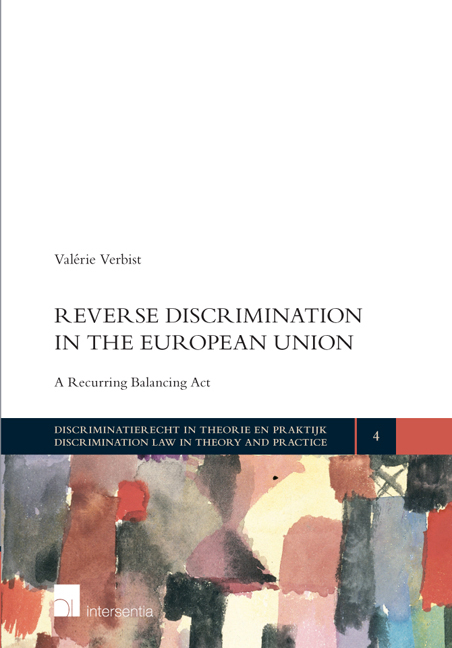Book contents
- Frontmatter
- Acknowledgements
- Contents
- Table of Cases of the European Court of Justice
- Chapter 1 Introduction
- Part I Reverse Discrimination from a Union Perspective
- Chapter 2 The European Court of Justice's Approach to Reverse Discrimination
- Chapter 3 Applicability and Interpretation of the Purely Internal Situation Doctrine
- Conclusion Part I
- Part II Reverse Discrimination from National Perspectives
- Part III Reverse Discrimination in a Federal State Context
- Bibliography
Chapter 3 - Applicability and Interpretation of the Purely Internal Situation Doctrine
from Part I - Reverse Discrimination from a Union Perspective
Published online by Cambridge University Press: 29 September 2018
- Frontmatter
- Acknowledgements
- Contents
- Table of Cases of the European Court of Justice
- Chapter 1 Introduction
- Part I Reverse Discrimination from a Union Perspective
- Chapter 2 The European Court of Justice's Approach to Reverse Discrimination
- Chapter 3 Applicability and Interpretation of the Purely Internal Situation Doctrine
- Conclusion Part I
- Part II Reverse Discrimination from National Perspectives
- Part III Reverse Discrimination in a Federal State Context
- Bibliography
Summary
In Chapter 2, it was argued that the Court's principled position on reverse discrimination should be approved of on the basis of the current Treaties. Accordingly, situations that do not have a sufficient connection with Union law fall outside of the scope of application of Union law and within the scope of application of national law. However, the sore spot of this case law is the question of what precisely constitutes a situation that falls under Union law. Or, putting it another way, what exactly are purely internal situations? As Van Elsuwege and Kochenov have formulated it: ‘the potential for reverse discrimination entirely depends on the dividing line between the scope of EU law and national law. This line is virtually never straightforward’. This is exactly what will be discussed in this chapter; the recent evolutions in the ECJ's interpretation of the purely internal situation doctrine in particular will be examined. The ECJ seems to be increasingly willing to accept that a given issue has a sufficient link with Union law in order to apply the Treaty provisions on free movement and citizenship. The concept of Union citizenship particularly seems to play an important role in this evolution.
The major flaw of the Court of Justice‘s case law, concerning the interpretation of the purely internal situation doctrine is the unpredictability of whether or not a situation will fall within the scope of application of Union law. Accordingly, several Advocates General as well as legal scholars have developed proposals for the ECJ to either widen or to constrain the scope of application of the Union provisions on free movement and citizenship. The common point of departure for these diverse proposals is that the ECJ's case law on purely internal situations should be based upon clear and straightforward guidelines.
APPLICABILITY OF THE PURELY INTERNAL SITUATION DOCTRINE
THE PURELY INTERNAL SITUATION DOCTRINE IS APPLICABLE TO TREATY PROVISIONS ON FREE MOVEMENT AND CITIZENSHIP
We have already been introduced to the ECJ's purely internal situation doctrine in Chapter 2, in which it was noted that the ECJ defined the notion of purely internal situations for the first time in the Saunders case.
- Type
- Chapter
- Information
- Reverse Discrimination in the European UnionA Recurring Balancing Act, pp. 47 - 156Publisher: IntersentiaPrint publication year: 2017

